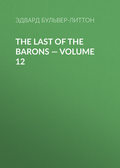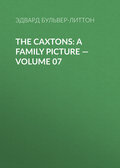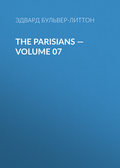
Эдвард Бульвер-Литтон
Devereux — Complete
CHAPTER II
GAY SCENES AND CONVERSATIONS.—THE NEW EXCHANGE AND THE PUPPET-SHOW.—THE ACTOR, THE SEXTON, AND THE BEAUTY
“WELL, Tarleton,” said I, looking round that mart of millinery and love-making, which, so celebrated in the reign of Charles II., still preserved the shadow of its old renown in that of Anne,—“well, here we are upon the classical ground so often commemorated in the comedies which our chaste grandmothers thronged to see. Here we can make appointments, while we profess to buy gloves, and should our mistress tarry too long, beguile our impatience by a flirtation with her milliner. Is there not a breathing air of gayety about the place?—does it not still smack of the Ethereges and Sedleys?”
“Right,” said Tarleton, leaning over a counter and amorously eying the pretty coquette to whom it belonged; while, with the coxcombry then in fashion, he sprinkled the long curls that touched his shoulders with a fragrant shower from a bottle of jessamine water upon the counter,—“right; saw you ever such an eye? Have you snuff of the true scent, my beauty—foh! this is for the nostril of a Welsh parson—choleric and hot, my beauty,—pulverized horse-radish,—why, it would make a nose of the coldest constitution imaginable sneeze like a washed school-boy on a Saturday night.—Ah, this is better, my princess: there is some courtesy in this snuff; it flatters the brain like a poet’s dedication. Right, Devereux, right, there is something infectious in the atmosphere; one catches good humour as easily as if it were cold. Shall we stroll on?—my Clelia is on the other side of the Exchange.—You were speaking of the play-writers: what a pity that our Ethereges and Wycherleys should be so frank in their gallantry that the prudish public already begins to look shy on them. They have a world of wit!”
“Ay,” said I; “and, as my good uncle would say, a world of knowledge of human nature, namely, of the worst part of it. But they are worse than merely licentious: they are positively villanous; pregnant with the most redemptionless scoundrelism,—cheating, lying, thieving, and fraud; their humour debauches the whole moral system; they are like the Sardinian herb,—they make you laugh, it is true, but they poison you in the act. But who comes here?”
“Oh, honest Coll!—Ah, Cibber, how goes it with you?”
The person thus addressed was a man of about the middle age, very grotesquely attired, and with a periwig preposterously long. His countenance (which, in its features, was rather comely) was stamped with an odd mixture of liveliness, impudence, and a coarse yet not unjoyous spirit of reckless debauchery. He approached us with a saunter, and saluted Tarleton with an air servile enough, in spite of an affected familiarity.
“What think you,” resumed my companion, “we were conversing upon?”
“Why, indeed, Mr. Tarleton,” answered Cibber, bowing very low, “unless it were the exquisite fashion of your waistcoat, or your success with my Lady Duchess, I know not what to guess.”
“Pooh, man,” said Tarleton, haughtily, “none of your compliments;” and then added in a milder tone, “No, Colley, we were abusing the immoralities that existed on the stage until thou, by the light of thy virtuous example, didst undertake to reform it.”
“Why,” rejoined Cibber, with an air of mock sanctity, “Heaven be praised, I have pulled out some of the weeds from our theatrical parterre—”
“Hear you that, Count? Does he not look a pretty fellow for a censor?”
“Surely,” said Cibber, “ever since Dicky Steele has set up for a saint, and assumed the methodistical twang, some hopes of conversion may be left even for such reprobates as myself. Where, may I ask, will Mr. Tarleton drink to-night?”
“Not with thee, Coll. The Saturnalia don’t happen every day. Rid us now of thy company: but stop, I will do thee a pleasure; know you this gentleman?”
“I have not that extreme honour.”
“Know a Count, then! Count Devereux, demean yourself by sometimes acknowledging Colley Cibber, a rare fellow at a song, a bottle, and a message to an actress; a lively rascal enough, but without the goodness to be loved, or the independence to be respected.”
“Mr. Cibber,” said I, rather hurt at Tarleton’s speech, though the object of it seemed to hear this description with the most unruffled composure—“Mr. Cibber, I am happy and proud of an introduction to the author of the ‘Careless Husband.’ Here is my address; oblige me with a visit at your leisure.”
“How could you be so galling to the poor devil?” said I, when Cibber, with a profusion of bows and compliments, had left us to ourselves.
“Ah, hang him,—a low fellow, who pins all his happiness to the skirts of the quality, is proud of being despised, and that which would excruciate the vanity of others only flatters his. And now for my Clelia.”
After my companion had amused himself with a brief flirtation with a young lady who affected a most edifying demureness, we left the Exchange, and repaired to the puppet-show.
On entering the Piazza, in which, as I am writing for the next century, it may be necessary to say that Punch held his court, we saw a tall, thin fellow, loitering under the columns, and exhibiting a countenance of the most ludicrous discontent. There was an insolent arrogance about Tarleton’s good-nature, which always led him to consult the whim of the moment at the expense of every other consideration, especially if the whim referred to a member of the canaille whom my aristocratic friend esteemed as a base part of the exclusive and despotic property of gentlemen.
“Egad, Devereux,” said he, “do you see that fellow? he has the audacity to affect spleen. Faith, I thought melancholy was the distinguishing patent of nobility: we will smoke him.” And advancing towards the man of gloom, Tarleton touched him with the end of his cane. The man started and turned round. “Pray, sirrah,” said Tarleton, coldly, “pray who the devil are you that you presume to look discontented?”
“Why, Sir,” said the man, good-humouredly enough, “I have some right to be angry.”
“I doubt it, my friend,” said Tarleton. “What is your complaint? a rise in the price of tripe, or a drinking wife? Those, I take it, are the sole misfortunes incidental to your condition.”
“If that be the case,” said I, observing a cloud on our new friend’s brow, “shall we heal thy sufferings? Tell us thy complaints, and we will prescribe thee a silver specific; there is a sample of our skill.”
“Thank you humbly, gentlemen,” said the man, pocketing the money, and clearing his countenance; “and seriously, mine is an uncommonly hard case. I was, till within the last few weeks, the under-sexton of St. Paul’s, Covent Garden, and my duty was that of ringing the bells for daily prayers but a man of Belial came hitherwards, set up a puppet-show, and, timing the hours of his exhibition with a wicked sagacity, made the bell I rang for church serve as a summons to Punch,—so, gentlemen, that whenever your humble servant began to pull for the Lord, his perverted congregation began to flock to the devil; and, instead of being an instrument for saving souls, I was made the innocent means of destroying them. Oh, gentlemen, it was a shocking thing to tug away at the rope till the sweat ran down one, for four shillings a week; and to see all the time that one was thinning one’s own congregation and emptying one’s own pockets!”
“It was indeed a lamentable dilemma; and what did you, Mr. Sexton?”
“Do, Sir? why, I could not stifle my conscience, and I left my place. Ever since then, Sir, I have stationed myself in the Piazza, to warn my poor, deluded fellow-creatures of their error, and to assure them that when the bell of St. Paul’s rings, it rings for prayers, and not for puppet-shows, and—Lord help us, there it goes at this very moment; and look, look, gentlemen, how the wigs and hoods are crowding to the motion5 instead of the minister.”
“Ha! ha! ha!” cried Tarleton, “Mr. Powell is not the first man who has wrested things holy to serve a carnal purpose, and made use of church bells in order to ring money to the wide pouch of the church’s enemies. Hark ye, my friend, follow my advice, and turn preacher yourself; mount a cart opposite to the motion, and I’ll wager a trifle that the crowd forsake the theatrical mountebank in favour of the religious one; for the more sacred the thing played upon, the more certain is the game.”
“Body of me, gentlemen,” cried the ex-sexton, “I’ll follow your advice.”
“Do so, man, and never presume to look doleful again; leave dulness to your superiors.”6
And with this advice, and an additional compensation for his confidence, we left the innocent assistant of Mr. Powell, and marched into the puppet-show, by the sound of the very bells the perversion of which the good sexton had so pathetically lamented.
The first person I saw at the show, and indeed the express person I came to see, was the Lady Hasselton. Tarleton and myself separated for the present, and I repaired to the coquette. “Angels of grace!” said I, approaching; “and, by the by, before I proceed another word, observe, Lady Hasselton, how appropriate the exclamation is to you! Angels of grace! why, you have moved all your patches—one—two—three—six— eight—as I am a gentleman, from the left side of your cheek to the right! What is the reason of so sudden an emigration?”
“I have changed my politics, Count,7 that is all, and have resolved to lose no time in proclaiming the change. But is it true that you are going to be married?”
“Married! Heaven forbid! which of my enemies spread so cruel a report?”
“Oh, the report is universal!” and the Lady Hasselton flirted her fan with the most flattering violence.
“It is false, nevertheless; I cannot afford to buy a wife at present, for, thanks to jointures and pin-money, these things are all matters of commerce; and (see how closely civilized life resembles the savage!) the English, like the Tartar gentleman, obtains his wife only by purchase! But who is the bride?”
“The Duke of Newcastle’s rich daughter, Lady Henrietta Pelham.”
“What, Harley’s object of ambition!8 Faith, Madam, the report is not so cruel as I thought for!”
“Oh, you fop!—but is it not true?”
“By my honour, I fear not; my rivals are too numerous and too powerful. Look now, yonder! how they already flock around the illustrious heiress; note those smiles and simpers. Is it not pretty to see those very fine gentlemen imitating bumpkins at a fair, and grinning their best for a gold ring! But you need not fear me, Lady Hasselton, my love cannot wander if it would. In the quaint thought of Sidney,9 love having once flown to my heart, burned its wings there, and cannot fly away.”
“La, you now!” said the Beauty; “I do not comprehend you exactly: your master of the graces does not teach you your compliments properly.”
“Yes, he does, but in your presence I forget them; and now,” I added, lowering my voice into the lowest of whispers, “now that you are assured of my fidelity, will you not learn at last to discredit rumours and trust to me?”
“I love you too well!” answered the Lady Hasselton in the same tone, and that answer gives an admirable idea of the affection of every coquette! love and confidence with them are qualities that have a natural antipathy, and can never be united. Our tete-a-tete was at an end; the people round us became social, and conversation general.
“Betterton acts to-morrow night,” cried the Lady Pratterly: “we must go!”
“We must go,” cried the Lady Hasselton.
“We must go!” cried all.
And so passed the time till the puppet-show was over, and my attendance dispensed with.
It is a charming thing to be the lover of a lady of the mode! One so honoured does with his hours as a miser with his guineas; namely, nothing but count them!
CHAPTER III
MORE LIONS
THE next night, after the theatre, Tarleton and I strolled into Wills’s. Half-a-dozen wits were assembled. Heavens! how they talked! actors, actresses, poets, statesmen, philosophers, critics, divines, were all pulled to pieces with the most gratifying malice imaginable. We sat ourselves down, and while Tarleton amused himself with a dish of coffee and the “Flying Post,” I listened very attentively to the conversation. Certainly if we would take every opportunity of getting a grain or two of knowledge, we should soon have a chest-full; a man earned an excellent subsistence by asking every one who came out of a tobacconist’s shop for a pinch of snuff, and retailing the mixture as soon as he had filled his box.10
While I was listening to a tall lusty gentleman, who was abusing Dogget, the actor, a well-dressed man entered, and immediately attracted the general observation. He was of a very flat, ill-favoured countenance, but of a quick eye, and a genteel air; there was, however, something constrained and artificial in his address, and he appeared to be endeavouring to clothe a natural good-humour with a certain primness which could never be made to fit it.
“Ha, Steele!” cried a gentleman in an orange-coloured coat, who seemed by a fashionable swagger of importance desirous of giving the tone to the company,—“Ha, Steele, whence come you? from the chapel or the tavern?” and the speaker winked round the room as if he wished us to participate in the pleasure of a good thing.
Mr. Steele drew up, seemingly a little affronted; but his good-nature conquering the affectation of personal sanctity, which, at the time I refer to, that excellent writer was pleased to assume, he contented himself with nodding to the speaker, and saying,—
“All the world knows, Colonel Cleland, that you are a wit, and therefore we take your fine sayings as we take change from an honest tradesman,—rest perfectly satisfied with the coin we get, without paying any attention to it.”
“Zounds, Cleland, you got the worst of it there,” cried a gentleman in a flaxen wig. And Steele slid into a seat near my own.
Tarleton, who was sufficiently well educated to pretend to the character of a man of letters, hereupon thought it necessary to lay aside the “Flying Post,” and to introduce me to my literary neighbour.
“Pray,” said Colonel Cleland, taking snuff and swinging himself to and fro with an air of fashionable grace, “has any one seen the new paper?”
“What!” cried the gentleman in the flaxen wig, “what! the ‘Tatler’s’ successor,—the ‘Spectator’?”
“The same,” quoth the colonel.
“To be sure; who has not?” returned he of the flaxen ornament. “People say Congreve writes it.”
“They are very much mistaken, then,” cried a little square man with spectacles; “to my certain knowledge Swift is the author.”
“Pooh!” said Cleland, imperiously, “pooh! it is neither the one nor the other; I, gentlemen, am in the secret—but—you take me, eh? One must not speak well of one’s self; mum is the word.”
“Then,” asked Steele, quietly, “we are to suppose that you, Colonel, are the writer?”
“I never said so, Dicky; but the women will have it that I am,” and the colonel smoothed down his cravat.
“Pray, Mr. Addison, what say you?” cried the gentleman in the flaxen wig; “are you for Congreve, Swift, or Colonel Cleland?” This was addressed to a gentleman of a grave but rather prepossessing mien; who, with eyes fixed upon the ground, was very quietly and to all appearance very inattentively solacing himself with a pipe; without lifting his eyes, this personage, then eminent, afterwards rendered immortal, replied,
“Colonel Cleland must produce other witnesses to prove his claim to the authorship of the ‘Spectator:’ the women, we well know, are prejudiced in his favour.”
“That’s true enough, old friend,” cried the colonel, looking askant at his orange-coloured coat; “but faith, Addison, I wish you would set up a paper of the same sort, d’ye see; you’re a nice judge of merit, and your sketches of character would do justice to your friends.”
“If ever I do, Colonel, I, or my coadjutors, will study at least to do justice to you.”11
“Prithee, Steele,” cried the stranger in spectacles, “prithee, tell us thy thoughts on the subject: dost thou know the author of this droll periodical?”
“I saw him this morning,” replied Steele, carelessly.
“Aha! and what said you to him?”
“I asked him his name.”
“And what did he answer?” cried he of the flaxen wig, while all of us crowded round the speaker, with the curiosity every one felt in the authorship of a work then exciting the most universal and eager interest.
“He answered me solemnly,” said Steele, “in the following words,—
“‘Graeci carent ablativo, Itali dativo, ego nominativo.’”12
“Famous—capital!” cried the gentleman in spectacles; and then, touching Colonel Cleland, added, “what does it exactly mean?”
“Ignoramus!” said Cleland, disdainfully, “every schoolboy knows Virgil!”
“Devereux,” said Tarleton, yawning, “what a d——d delightful thing it is to hear so much wit: pity that the atmosphere is so fine that no lungs unaccustomed to it can endure it long, Let us recover ourselves by a walk.”
“Willingly,” said I; and we sauntered forth into the streets.
“Wills’s is not what it was,” said Tarleton; “‘tis a pitiful ghost of its former self, and if they had not introduced cards, one would die of the vapours there.”
“I know nothing so insipid,” said I, “as that mock literary air which it is so much the fashion to assume. ‘Tis but a wearisome relief to conversation to have interludes of songs about Strephon and Sylvia, recited with a lisp by a gentleman with fringed gloves and a languishing look.”
“Fie on it,” cried Tarleton, “let us seek for a fresher topic. Are you asked to Abigail Masham’s to-night, or will you come to Dame de la Riviere Manley’s?”
“Dame de la what?—in the name of long words who is she?”
“Oh! Learning made libidinous: one who reads Catullus and profits by it.”
“Bah, no, we will not leave the gentle Abigail for her. I have promised to meet St. John, too, at the Mashams’.”
“As you like. We shall get some wine at Abigail’s, which we should never do at the house of her cousin of Marlborough.”
And, comforting himself with this belief, Tarleton peaceably accompanied me to that celebrated woman, who did the Tories such notable service, at the expense of being termed by the Whigs one great want divided into two parts; namely, a great want of every shilling belonging to other people, and a great want of every virtue that should have belonged to herself. As we mounted the staircase, a door to the left (a private apartment) was opened, and I saw the favourite dismiss, with the most flattering air of respect, my old preceptor, the Abbe Montreuil. He received her attentions as his due, and, descending the stairs, came full upon me. He drew back, changed neither hue nor muscle, bowed civilly enough, and disappeared. I had not much opportunity to muse over this circumstance, for St. John and Mr. Domville—excellent companions both—joined us; and the party being small, we had the unwonted felicity of talking, as well as bowing, to each other. It was impossible to think of any one else when St. John chose to exert himself; and so even the Abbe Montreuil glided out of my brain as St. John’s wit glided into it. We were all of the same way of thinking on politics, and therefore were witty without being quarrelsome,—a rare thing. The trusty Abigail told us stories of the good Queen, and we added bons mots by way of corollary. Wine, too, wine that even Tarleton approved, lit up our intellects, and we spent altogether an evening such as gentlemen and Tories very seldom have the sense to enjoy.
O Apollo! I wonder whether Tories of the next century will be such clever, charming, well-informed fellows as we were!






